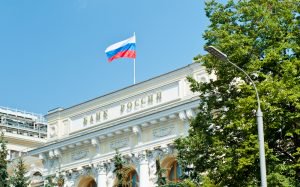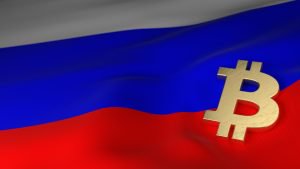The first deputy Governor of Russia’s Central Bank, Sergei Shvetsov, is reported to have stated that Russia will move to institute a nationwide ban on access to cryptocurrency exchange websites.
Also Read: Russia’s Central Bank Instructs Clearinghouse Not to Settle Cryptocurrency Contracts
The Bank of Russia and the Prosecutor General’s Office Are Expected to Block Access to Cryptocurrency Exchange Websites

The Russian media outlet RBU has reported that the Bank of Russia and the Prosecutor General’s Office are working together to block access to cryptocurrency exchanges across Russia. Shvetsov is reported to have stated that the institutions “are working together with the attorney general to block foreign sites which allow our citizens to purchase instruments of this kind.”
Speaking at a financial derivatives event held in Moscow, Shvetsov stated “we think that for our citizens, for businesses the usage of such cryptocurrencies as an investment object carries unreasonably high risks. We cannot give direct and easy access to such dubious instruments for retail investors.”
Shvetsov described the bitcoin and cryptocurrency markets as comprising a “pyramid scheme”, stating that “bitcoin is turning into an asset which is bought in hopes of fast returns, and therefore it has characteristics of a financial pyramid scheme.”
Shvetsov also spoke damningly of cryptocurrency derivatives markets, stating that the central bank “see[s] all derivatives on crypto as negative phenomena for our market. Not only can’t we support it, we will make every effort to limit for the regulated sector the option to operate with such types of instruments.”
The announcement comes just days after RBC reported that the Russian Association of Cryptocurrency and Blockchain had “began to collect proposals… that should form the basis of [a] draft law legalizing ICOs.” In the report, the executive director of the Russian Academy of Military Sciences, Arkheniy Shcheltsin, indicated that the word cryptocurrency was unlikely to feature in the draft legislation, stating that “cryptocurrency is a separate issue.”
Russia’s Regulatory Position Regarding Cryptocurrencies Has Been Historically Ambiguous

Russia has had a tumultuous history with regards to its legal position on cryptocurrencies, as the nation has appeared to oscillate between seeking to prohibit and encourage activities in the nascent virtual currency industries. In 2014, Bank of Russia warned that cryptocurrency use may be in violation of Article 27 of the law ‘On the Central Bank of the Russian Federation’ – which prohibits the use of money surrogates throughout Russia.
In recent months, Russia has appeared to be edging towards developing a tightly controlled regulatory apparatus permitting the use of cryptocurrencies for various purposes through the country – including considering including offering state subsidies for major mining operations, and proposals from the Ministry of Finance recommending the introduction of cryptocurrency educational programs as part of the country’s Financial Literacy Strategy.
The events of recent weeks, however, have again aroused concerns pertaining to the regulatory future of cryptocurrencies in Russia. At the end of September, Russian regulators failed to agree on virtual currencies, and postponed the development of cryptocurrency legislation until next year. Earlier this week, Russia’s central bank also instructed the major Russian clearinghouse, MFB Clearing Center, to “refuse to deal with cryptocurrencies”, following MFB’s publication of new rules on its website that included provisions pertaining to the clearing of OTC contracts based on virtual currencies.
Do you think that more nations are likely to initiate crackdowns on cryptocurrency exchanges? Share your thoughts in the comments section below!
Images courtesy of Shutterstock
Do you agree with us that Bitcoin is the best invention since sliced bread? Thought so. That’s why we are building this online universe revolving around anything and everything Bitcoin. We have a store. And a forum. And a casino, a pool and real-time price statistics.














